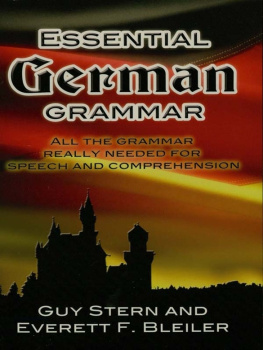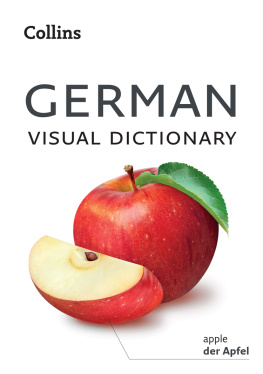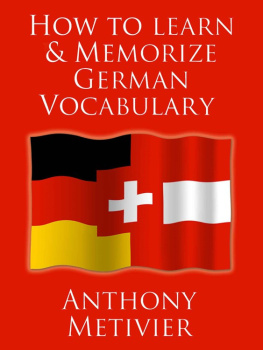Mag. Schaller has become my most favorite teacher here in Austria. One of the reasons is that he is very friendly, professional and down to earth in helping the students learn German."(Aboi Aimol, www.pageroot.com )TABLE OF CONTENTS:
1, Alles ist mglich oder nichts ist unmglich (engl.: Everything is possible or nothing is impossible)

 You are going to Learn:
You are going to Learn:
Basic principles of the German language. Alles ist mglich (= everything is possible) were the first words of German that a refugee learnt when he was brought to a camp in Austria a few years ago. This sentence characterizes the mentality among the people in his home country, he thought, and soon these words became his motto! A few days later he was cutting a tree when an old man approached him and asked if he was capable of doing small jobs instead of studying German in the asylum center. Our friend responded with, Alles ist mglich.
The old man added the words, oder nichts ist unmglich! Our refugee was in need of money, so he missed all the German classes during the following time. But he translated the words he had heard with the help of a cheap mobile phone, he had just bought with his first earnings. And he found out that this old man was damn right: Alles ist mglich equals Nichts ist unmglich (everything is possible equals nothing is impossible) The refugee had never attended a single German class when I met him years later and he told me this fascinating story. But he proved that he had done an impressing job: studying German by himself. Studying the language in a different and very individual way believing in the credo Nothing is impossible! This is probably the fastest way to achieve a basic knowledge of the German language. As an experienced trainer and author of several books I have ripped grammar and vocabulary to the bones.
And now I am going to present to you a revolutionary method to gain the success of mastering the A 1 level potentially within TWO days! Maybe the most direct and comprehensive way to memorize the most essential words, facts and forms of grammar - combined with useful phrases and questions & answers. Studying in a very natural way like kids would do.We just have to imagine the following structures which will be personified: *the first person I (Simon) and *you (the questioner) as the second person. Following the 3rd persons he (Ali), she (Fatma) and it (the baby in German language neuter). These are the Singulars. Further on the Plurals: *we (Me and You together) is the first person plural and *an interviewer is questioning us seeing us as second person plural. In German we say:Singular:
- 1. ich
- 2. du / Sie (the formal you)
- 3. er, sie, es
Plural:- 1. wir
- 2. ihr / Sie (the formal you)
- 3. sie
 Hint:Dont get confused by the sie-form: The German sie can mean she or they in English (you will spot the difference if you focus in the situation or the ending of the matching verb!), also Sie (with a capital S) likely is the formal you, a pronoun you use expressing more respect to your partner in a conversation!There is no need to have the knowledge of basic vocabulary at this point, due to the fact that at the end of our powerful grammar training all the words and phrases are translated!
Hint:Dont get confused by the sie-form: The German sie can mean she or they in English (you will spot the difference if you focus in the situation or the ending of the matching verb!), also Sie (with a capital S) likely is the formal you, a pronoun you use expressing more respect to your partner in a conversation!There is no need to have the knowledge of basic vocabulary at this point, due to the fact that at the end of our powerful grammar training all the words and phrases are translated! After having understood the structure of grammar (I strongly recommend learning the following tables by heart!), vocabulary will be the next big task: Start studying the list of the 165 probably most relevant German words - represented by the flashcards in the appendix! I have selected these specific words because they score a very high level of occurrence in German language texts.
So you may take one unique chance to get to understand a German text with limited effort and this at a very early stage of learning! After the THE SECRET OF LEARNING GERMAN FAST-course you should continue with all the VERBS IN ALL TENSES (!!!) since most of them are irregular.
So you may take one unique chance to get to understand a German text with limited effort and this at a very early stage of learning! After the THE SECRET OF LEARNING GERMAN FAST-course you should continue with all the VERBS IN ALL TENSES (!!!) since most of them are irregular.
You save a lot of nerves and time if you start doing it that way right after studying this book! For my book Deutsch lernen mit Mag. Schaller (Level A1) www.german-deutsch.com (ISBN 978-3-7357-5744-9) I have been collecting a long list with these verbs alongside more German A1-studying material. I also strongly recommend you to memorize each NOUN + ARTICLE and + PLURAL (!!!) from the scratch as this is highly relevant for later progress! German nouns belong to 3 different genders the MASCULINE with the article der, the FEMININE with die and the NEUTER with das! For this book, I have chosen different colours to highlight the different forms: BLUE for MASCULINE, RED for FEMININE, GREEN for NEUTER.Fortunately the plural does not change and in the first case they all are die (e. g. die Berge, die Freunde, die Kinder! And this brings us to the next point to consider from the beginning on: the cases! We have four different cases with different articles in the singular and plurals (so altogether 8 - and mostly different - forms). Furthermore, we have different declinations referring to the gender of the specific noun! However, believe me, the toughest effort is trying to find the appropriate ending of an adjective when you combine it with the adequate form of the noun and the hopefully correct article!  Hint:No need to remind you of what I have said before about the need of learning the nouns together with the corresponding articles! So, now you might not wonder why a lot of students fail or lose a lot of time trying to reach at least a basic knowledge of German.
Hint:No need to remind you of what I have said before about the need of learning the nouns together with the corresponding articles! So, now you might not wonder why a lot of students fail or lose a lot of time trying to reach at least a basic knowledge of German.
I do not want to discourage you on the contrary: All you will learn the next few days is going to be very simple, and you will automatically and intuitively master basic structures: Despite all these well-known facts THE SECRET OF LEARNING GERMAN FAST eases you into the process when you are starting to learn and understand these complex rules. The first and most important step is to understand the structure of the simple German sentence. While the questions (except the yes/no questions) usually start with a question word, the general German sentence is structurized mainly in the following way: SUBJECT (1st) VERB (the verb is at the second position in the main clause sentence this is a rather strict rule!) - (sometimes) ADVERB(S) the OBJECT(S) in the 1st (very rare, just for saying your name or giving a name to someone/something), 2nd, 3rd and/or 4th case (comparable to English we have sentences without object, one or more objects (depending on the value of a verb) - (maybe another) ADVERB (and finally often another 2nd or rarely a 3rd) VERB. Often we find past participle forms, infinitives or seperated prefixes (like um-, mit-, an- ) there.
















 You are going to Learn:
You are going to Learn: Basic principles of the German language. Alles ist mglich (= everything is possible) were the first words of German that a refugee learnt when he was brought to a camp in Austria a few years ago. This sentence characterizes the mentality among the people in his home country, he thought, and soon these words became his motto! A few days later he was cutting a tree when an old man approached him and asked if he was capable of doing small jobs instead of studying German in the asylum center. Our friend responded with, Alles ist mglich.
Basic principles of the German language. Alles ist mglich (= everything is possible) were the first words of German that a refugee learnt when he was brought to a camp in Austria a few years ago. This sentence characterizes the mentality among the people in his home country, he thought, and soon these words became his motto! A few days later he was cutting a tree when an old man approached him and asked if he was capable of doing small jobs instead of studying German in the asylum center. Our friend responded with, Alles ist mglich.  Hint:Dont get confused by the sie-form: The German sie can mean she or they in English (you will spot the difference if you focus in the situation or the ending of the matching verb!), also Sie (with a capital S) likely is the formal you, a pronoun you use expressing more respect to your partner in a conversation!There is no need to have the knowledge of basic vocabulary at this point, due to the fact that at the end of our powerful grammar training all the words and phrases are translated! After having understood the structure of grammar (I strongly recommend learning the following tables by heart!), vocabulary will be the next big task: Start studying the list of the 165 probably most relevant German words - represented by the flashcards in the appendix! I have selected these specific words because they score a very high level of occurrence in German language texts. So you may take one unique chance to get to understand a German text with limited effort and this at a very early stage of learning! After the THE SECRET OF LEARNING GERMAN FAST-course you should continue with all the VERBS IN ALL TENSES (!!!) since most of them are irregular. So you may take one unique chance to get to understand a German text with limited effort and this at a very early stage of learning! After the THE SECRET OF LEARNING GERMAN FAST-course you should continue with all the VERBS IN ALL TENSES (!!!) since most of them are irregular.
Hint:Dont get confused by the sie-form: The German sie can mean she or they in English (you will spot the difference if you focus in the situation or the ending of the matching verb!), also Sie (with a capital S) likely is the formal you, a pronoun you use expressing more respect to your partner in a conversation!There is no need to have the knowledge of basic vocabulary at this point, due to the fact that at the end of our powerful grammar training all the words and phrases are translated! After having understood the structure of grammar (I strongly recommend learning the following tables by heart!), vocabulary will be the next big task: Start studying the list of the 165 probably most relevant German words - represented by the flashcards in the appendix! I have selected these specific words because they score a very high level of occurrence in German language texts. So you may take one unique chance to get to understand a German text with limited effort and this at a very early stage of learning! After the THE SECRET OF LEARNING GERMAN FAST-course you should continue with all the VERBS IN ALL TENSES (!!!) since most of them are irregular. So you may take one unique chance to get to understand a German text with limited effort and this at a very early stage of learning! After the THE SECRET OF LEARNING GERMAN FAST-course you should continue with all the VERBS IN ALL TENSES (!!!) since most of them are irregular.